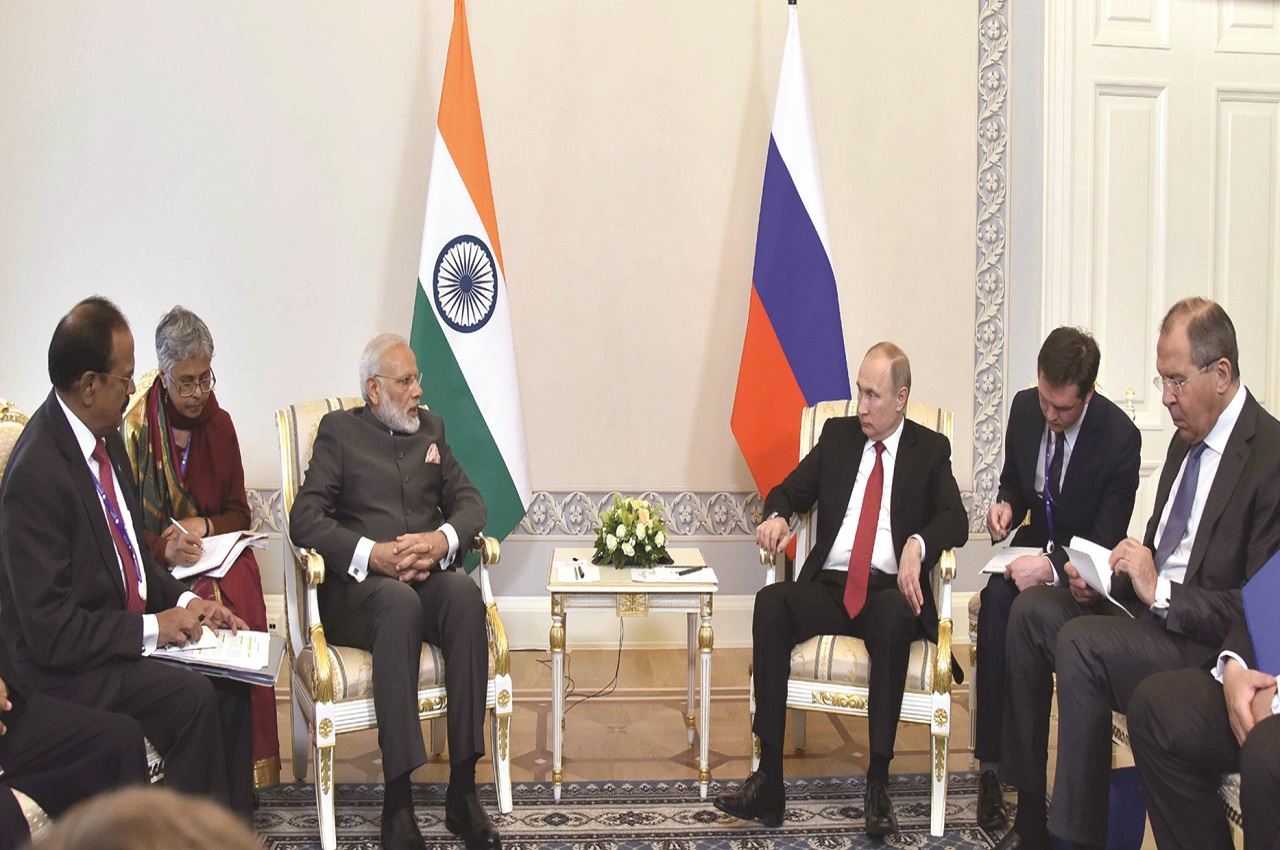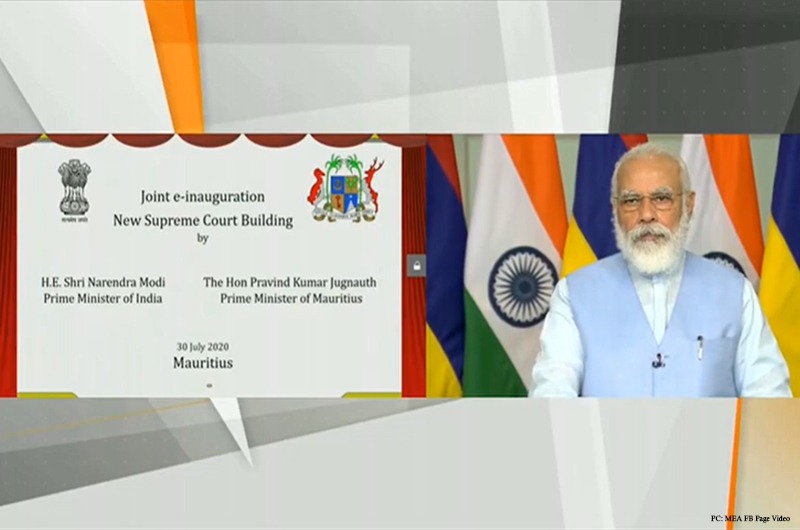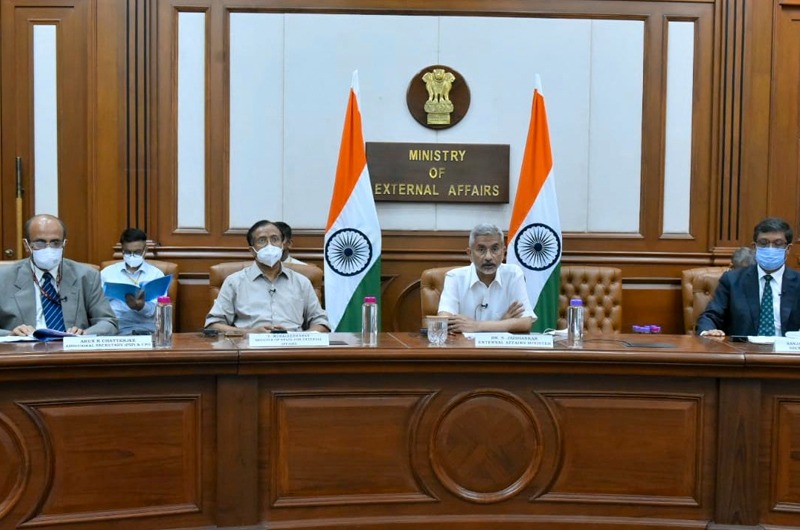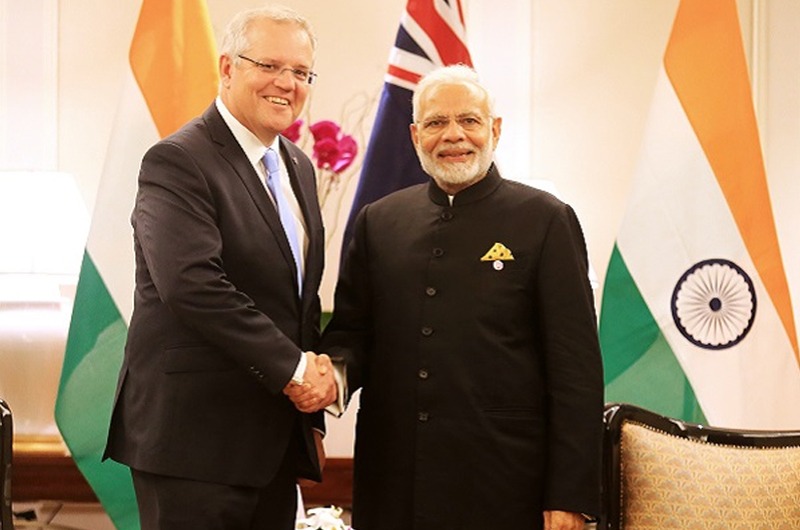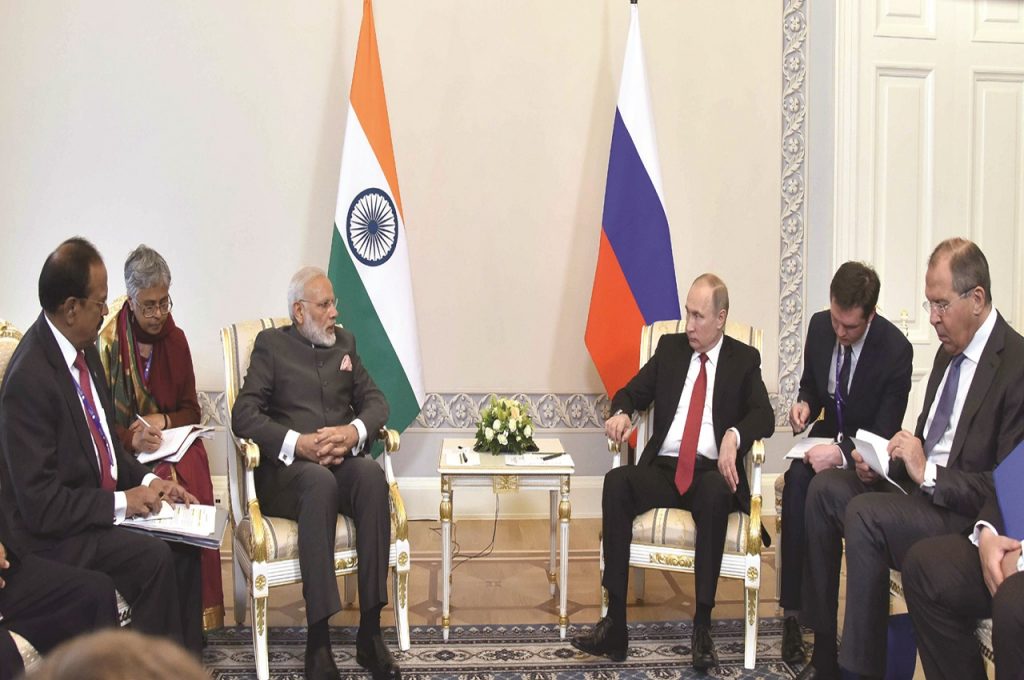
The 18th annual India-Russia summit held on June 1 in Russia’s former imperial capital of St. Petersburg between Prime Minister Narendra Modi and his Russian host Vladimir Putin has put the bilateral relations on a new growth trajectory as the two nations are marking the 70th anniversary of establishment of diplomatic relations.
Mr Modi also addressed the St. Petersburg International Economic Forum on June 2 – often dubbed as Eurasian Davos which underscored bilateral desires to give a fillip to weak economic ties and trade. Russia also announced that it will help India in indigenous production of weapon systems.
After the summit, the two countries have also issued a joint declaration: A Vision for 21st Century, presenting the roadmap for further growth and strengthening of bilateral relations in civil nuclear energy, joint development of advanced weapon systems and platforms, widest cooperation in combating terrorism, and boosting economic cooperation and trade between the two countries.
Russia will be building two more nuclear power plants at Kudankulam, and the General Framework Agreement and Credit Protocol in this regard is a key arrangement among the total 12 bilateral agreements signed between the two countries.
The two leaders have noted that cooperation in the peaceful uses of nuclear energy has emerged as one of the hallmarks of the strategic partnership between the two countries, contributing to India’s energy security and energising broader scientific and technological cooperation.
Prime Minister Modi and President Putin noted that growing partnership in the nuclear power sector between the two nations has opened opportunities for developing advanced nuclear manufacturing capabilities in India in line with Government of India’s “Make in India” initiative. India and Russia committed themselves in this perspective to implement the “Programme of Action for Localization in India” signed on 24 December 2015, and to encourage their nuclear industries to engage closely and foster concrete collaborations.
Russia has reaffirmed its strong support for India’s membership in the 48-nation Nuclear Suppliers Group (NSG), which so far has been blocked by China and some countries maintaining close links with Islamabad.
Experts here noted that Russia, which has already built and commissioned Units 1 and 2 of Kudankulam NPP , and is currently building units 4 and 5, will be the only country to immediately gain from India’s NSG membership, as it could make India a regional hub for the production and export of nuclear equipment and fuel.
Noting that their defence cooperation was “based on strong mutual trust,” India and Russia also agreed to upgrade and intensify this cooperation through joint manufacture, co-production and co-development of military hardware and military spares, with increasing reliance on the adoption and sharing of future technologies, in compliance with the obligations of the sides under the existing agreements on military-technical cooperation.
“The assembly of high-tech military products has been set up in India with Russia’s participation. We agreed with the Prime Minister to continue to jointly develop and manufacture modern weapons systems,” Putin said, adding the cooperation is not limited to direct supplies of the latest Russian military equipment to India.
To further enhance their interaction the PM Modi and President Putin have agreed to work towards a qualitatively higher level of military-to-military cooperation. This will be a win-win situation as the Indian Armed Forces are the biggest and long time users of Russian weapon platforms like the Sukhoi Su-30MKI fighters and T-90 main battle tanks. It may be noted that in the ongoing Syrian campaign, the Russian Army is battle proving its I 90 and accumulating combat experience.
Besides regular joint land and naval drills and training in each others’ military institutions, later this year India and Russia have agreed to expand their annual INDRA military exercise to tri-service level.
As Russian defence industry companies and senior officials involved in militarytechnical cooperation with India are under the US “Specially Designated Sanctions” on their bank accounts, the two countries agreed to encourage their entities for using their national currencies instead of the US Dollar. “We will jointly encourage our business communities to use the existing workable schemes and mechanisms for settlements in national currencies elaborated by the Reserve Bank of India and the Bank of Russia,” the Indo-Russian declaration stated.
On the curse of terrorism that is afflicting the world, the two leaders agreed that it was imperative to fight it in all its forms. In fact, the Indian Prime Minister declared: “India is grateful for Russia’s support in the fight against terrorism. India and Russia share views on Afghanistan and the Asia-Pacific region. We express the same positions within the G20 and the Shanghai Cooperation Organisation. Our countries will work to find a new format for international cooperation. ”
Terrorism was one of the major issues on the summit agenda. The India-Russia joint declaration said: “We strongly condemn terrorism in all its forms and manifestations and stress that there can be no justification whatsoever for any acts of terrorism, whether based upon ideological, religious, political, racial, ethnic or any other reasons. together, we will continue efforts to combat international terrorism, which poses a great threat to maintenance of peace and security.
India and Russia also urged all countries and entities to work sincerely to disrupt terrorist networks and their financing, and stop cross-border movement of terrorists. Mr Putin is reported to have assured Mr Modi that Moscow’s recent engagements with Pakistan “will not dilute the strategic, special privileged partnership with India.”
By: Vinay Shukla

